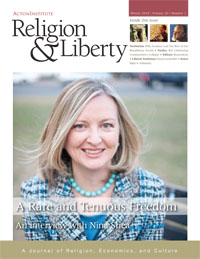
Shea pays tribute to the ten year collapse of communism in Eastern Europe, which began in the fall of 1989. The entire issue is dedicated to those who toiled for freedom. Shea is able to make the connection between important events and times in the Cold War with what is happening today in regards to religious persecution. Her passion on these issues is unmatched. Her experience and expertise on issues of religious persecution definitely shine through in this interview. I encourage readers to pay attention to her work.
Mark Tooley offers the feature piece for this issue, “Not Celebrating Communism’s Collapse.” It is an excellent look back at the religious left and their grave misjudgments about the true danger of Marxist dictatorships. Tooley declares, “Communism’s collapse did further discredit the Religious Left, and the political witness of mainline Protestantism and ecumenical groups like the WCC and NCC has arguably, and thankfully, never quite recovered from the events of 1989-1990.” Tooley is president of The Institute on Religion and Democracy in Washington, D.C. and author of Taking Back the United Methodist Church.
In this issue I offer a review of Steven P. Miller’s Billy Graham and the Rise of the Republican South, which appeared first on the PowerBlog.
“Repressions” is a series of voices that speak to the danger of an ideology that reduces man to merely a material creature, while violently squelching the spiritual. Because of the danger of an all controlling state, the Framers of the U.S. Constitution considered religious liberty the “first freedom,” the foundational freedom upon which others are built. They understood that religious freedom is the hallmark to a truly free and virtuous society, and is also meant to act as an important wall from encroachment by the state into our lives.
The issue also pays tribute to a well known figure, especially among evangelical Christians, Francis Schaeffer (1912-1984). Scaheffer, who spoke out against the godless totalitarian state also powerfully reminds us: “I believe that pluralistic secularism, in the long run, is a more deadly poison than straightforward persecution.”

